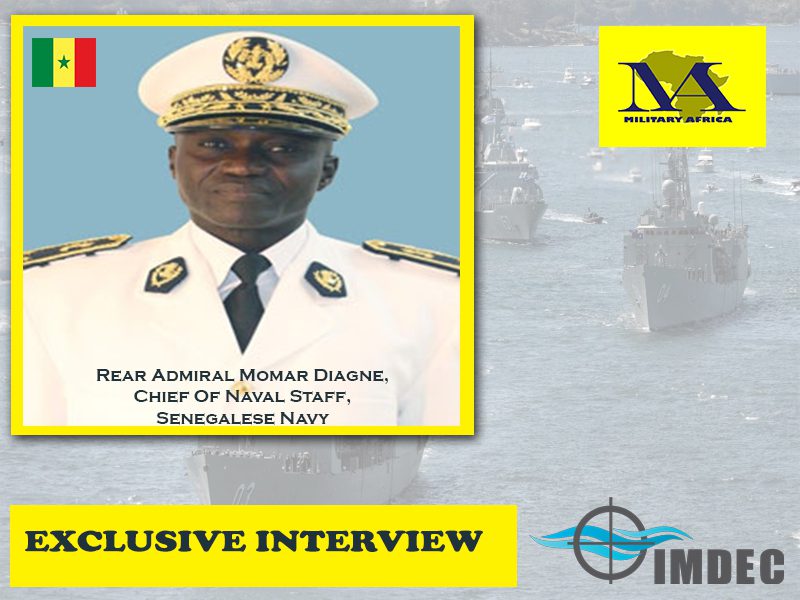Regarding the International Maritime Defence Exhibition & Conference (IMDEC 2019) expected to take place in Accra, Ghana on 24-25 July 2019 at the Kempinski Gold Coast, Military Africa obtained an exclusive interviews with various Chiefs of Naval Staff as they discuss the significance of interagency collaboration to secure the Gulf of Guinea and the important role industry plays in increasing maritime security.
PLEASE TELL US ABOUT YOURSELF- YOUR CURRENT ROLE AS SENEGAL’S CHIEF OF NAVAL STAFF, AND WHAT ARE THE KEY MANDATES OF SENEGAL’S NAVAL FORCE?
As Chief of Naval Staff, my role is to ensure that the men and women under my command are capable of conducting the full spectrum of their missions through suitable and comprehensive manning, training and equipment. Senegalese naval forces key mandates do not only consist of regular defense missions but also include the implementation of state policies at sea. Those latter missions such as fisheries protection, search and rescue etc. are complex in nature as they require interagency cooperation and specific skills and equipment especially in the current multidimensional maritime environment we operate in.
WHAT ARE YOU MOST LOOKING FORWARD TO WITH INTERNATIONAL MARITIME DEFENSE EXHIBITION AND CONFERENCE (IMDEC)? WHAT IS THE ADDED VALUE BROUGHT BY IMDEC SPECIFICALLY?
What I am most looking forward to with the International Maritime Defense Exhibition and Conference (IMDEC) is creating and deepening partnerships. The specific added value that the IMDEC will be bringing is the framework of international and regional cooperation at all levels either strategic, operational or between agencies. That cooperation is critical in facing current maritime issues in the Gulf of Guinea for solutions can only be found and implemented collectively.
A KEY FOCUS OF THE EVENT IS TO ENHANCE MARITIME SECURITY AND STABILITY WITHIN THE GULF OF GUINEA. WHAT ARE THE JOINT INITIATIVES, EXERCISES AND/OR PROGRAMS IN THE REGION THAT YOU BELIEVE ARE BEST AIDING MARITIME SECURITY?
In enhancing maritime security and stability within the Gulf of Guinea we need to foster and develop all programs, exercises and initiatives that help us work together. As I said earlier, the threats we are facing can only be dealt with through a comprehensive and collective approach. We need to learn, train and operate together. Therefore, frameworks such as “ The Symposium of heads of navies of the Gulf of Guinea region” or multinational exercises such as “OBANGAME EXPRESS” and “AFRICAN NEMO” do contribute in developing maritime security in the region.
HOW DO YOU FORESEE THE REGIONS’ NATIONS WORKING TOGETHER TO CURB ILLEGAL ACTIVITY ON THE GULF OF GUINEA? WHAT ARE SOME OF THE CHALLENGES AND REQUIREMENTS TO IMPROVE REGIONAL COORDINATION IN THE MARITIME DOMAIN?
I think that cooperation within the Gulf of Guinea region to curb illegal activity is improving considerably and will continue to do so. Our respective leaderships have taken the necessary steps towards regional cooperation through various initiatives such as the ECOWAS and ECCAS maritime strategies, the “Yaounde Code of Conduct” etc. Now, all we need to do is to concretize those initiatives by operationalizing the Regional Maritime Centers.
DEFINE THE INCREASING IMPORTANCE OF INTERSERVICE COLLABORATION (INCLUDING NAVIES, COAST GUARDS, ARMY, AIR FORCE, CUSTOMS AND PORTS) IN SECURING REGIONAL SEAS? HOW HAS NIGERIA’S ARMY SPEARHEADED THESE JOINT OPERATIONS WITHIN YOUR EEZ?
Interagency collaboration is critical in securing regional seas. Indeed, our maritime environment is complex and the operations we conduct are transversal. For instance, our maritime operations often cross domains. They can start at the sea and finish on land or vice versa and require the coordinated actions of several agencies. In addition, our developing nations can only allocate so many resources to maritime security so we need to use those assets and funding wisely by promoting joint operations. That is what Senegal is trying to do within its EEZ. Senegalese customs, police and fisheries are often embedded in Navy vessels in order to efficiently cover the full spectrum of maritime security.
WHAT RECOMMENDATIONS WOULD YOU GIVE SUPPLIERS HOPING TO AID MARITIME SECURITY STAKEHOLDERS IN SENEGAL AND WEST AFRICA AS A WHOLE?
Suppliers hoping to aid maritime security stakeholders in the region should focus on fostering and developing cooperation between navies through training, equipment and resources.
IN YOUR OPINION, WHICH ARE THE KEY MARITIME TECHNOLOGIES AND SYSTEMS INTRODUCED THAT BEST INCREASE MARITIME SECURITY?
Technologies and systems which contributed to improving maritime domain awareness within the region have considerably increased maritime security.
GOING FORWARD, WHAT DO YOU BELIEVE ARE THE ESSENTIAL REQUIREMENTS NEEDED BY GOVERNMENTS AND PRIVATE INDUSTRY SUPPLIERS TO CURB ILLICIT ACTIVITY WITHIN THE GULF OF GUINEA?
Now that our maritime domain awareness has been improved regionally, we need more and better platforms, SOPs and collective legal frameworks in order to act together upon that information and intelligence we gather and share.
To find out more information about the event visit, www.imdecafrica.com.
